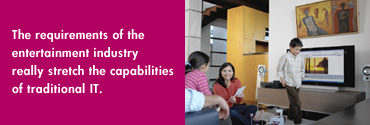
by Jamie Beckett
Movies and TV shows by entertainment giants Sony Pictures
and Warner Brothers will soon make use of a system originated
in HP Labs that dramatically alters how studios create and
distribute movies and television programs.
The HP Digital Media platform makes it possible for studios
to create content once and then reuse it many times in any
standard or format. A film can be stored as a high-quality
digital master and quickly converted for secure transmission
via wireless, cable, satellite, DSL or the Web.
For entertainment companies, that has the potential to dramatically
speed up delivery of the next blockbuster or hit show. At
the same time, it gives studios immediate access to the vast
collections of programming now stored in physical form in
their archives.
Shane Robison, HP executive vice president and chief strategy
technology officer, discussed the Digital Media Platform
and other aspects of HP's digital entertainment strategy
during his keynote talk today at the National Association
of Broadcasters' convention in Las Vegas.
The Digital Media Platform is an industry standards-based
framework of software, hardware and services that lets media
companies digitize, store, process, manage, distribute and
archive complex media assets securely and efficiently.
"It's something like an operating system for rich,
digital media," says Nick Wainwright, research director,
HP Digital Media Platform. "It's a platform on which
you can create large-scale, distributed applications that
link together the systems used to work with digital media."
These applications are needed as the entertainment industry
shifts from working with physical files to a process that
is digital from start to finish. In the past, producers who
needed an alternate version of a television program, for
instance, would have started with master tape, made a copy
and then sent that via delivery service to a post-production
house for editing, special effects insertion, audio mixing
and other tasks that occur after the cameras stop rolling.
The post-production house would then have sent a physical
copy back to the studio.
"Imagine if you had to send a floppy disk every time
you wanted to send a Word or PowerPoint document," says
Wainwright. "Our goal was to allow studios to treat
these 100 gigabyte files as effortlessly as possible -- ideally,
much like shared documents on a shared drive."
Although digital formats offer much more flexibility and
speed at a lower cost, they also present several challenges.
For starters, files are huge. Feature-length films are typically
80 to 100 gigabytes each, and large studios have libraries
of thousands of these.
"That's an awful lot of storage," says Andy Morgan,
a researcher on the Digital Media Platform Project. "These
files require specialized management and a lot of processing
to put them into a format for distribution."
Complicating matters further is the fact that different
forms of distribution have different requirements. For example,
video-on-demand requires bandwidth of 3-4 megabits per second,
while high-definition broadcast transmits at 10-20 megabits
per second.
Security is also an issue. Studios don't want master copies
of films or television programs to be leaked, so they keep
them in vaults and follow strict security procedures. Researchers
had to make sure that security for the digital versions would
be just as tight.
"The requirements of the entertainment
industry really stretch the capabilities of traditional IT," Morgan
says.
The platform has already been put to work by Ascent Media
Group (AMG), which performs substantial post-production activities
for Sony Pictures Entertainment and many other media companies.
AMG engineers worked with HP to develop the technology.
Now, Sony Pictures, Ascent Media and HP have formed an alliance
to move the formatting, management and distribution of Sony
Pictures' library of film and TV from analog to digital,
using technology and services from AMG and HP's Digital Media
Platform.
Since November 2004, AMG has completed digitization of about
600 Sony Pictures titles -- six times what it had expected
to finish by this time.
There is much more planned for the Digital Media Platform,
including a collaboration between Warner Brothers and HP
to transform the studio's entire film production and distribution
process to an all-digital, file-based system.
HP and Warner Brothers are formulating an architecture to
make the transition possible. HP's Digital Media Platform
provides the foundation for this architecture.
The project is huge: Last year, for instance, Warner Brothers
mastered 225 feature films for DVD release that required
26,000 hours of color correction and 10,000 hours of dirt
and scratch clean up. The company's global digital media
exchange facility delivers about 172 hours of video programming
weekly and last year produced more than 2,500 DVDs.
This isn't the first time HP Labs researchers have made
major contributions to changing how digital media is managed
and preserved.
Researchers played an integral part in the creation of ARKive
www.arkive.org, a "Noah's Ark" for the Internet
age. Launched in 2003, the online, searchable archive provides
a catalogue of film, photographs and audio records for the
world's endangered animals, plants and fungi.
HP Labs researchers and MIT Libraries jointly developed
DSpace www.dspace.org a groundbreaking digital repository
system that captures, stores, indexes, preserves and redistributes
an organization's research material in digital formats. The
free, open source software accepts and preserves all forms
of digital materials, including text, images, video and audio
files.
"This is the kind of work HP Labs is here for," says
Wainwright, who managed researchers on all three projects. "Our
mission is to create technologies for HP that have the potential
to transform industries. That's what we're doing."
|

